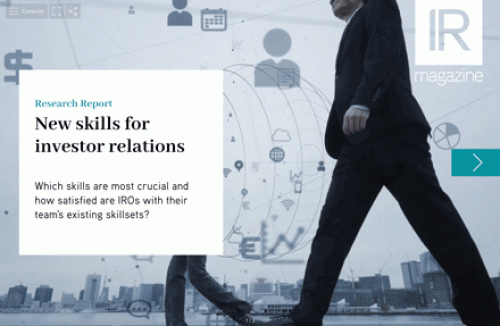Meet the Central and Eastern European leaders in IR and corporate governance
The role of the sell side, the monitoring of investor knowledge and the importance of company fundamentals were some of the highly debated topics at IR Magazine’s new symposium, which drew 60 IROs from Central and Eastern Europe to the Warsaw Stock Exchange for a day of conference and networking.
Kicking off with an extensive presentation of macroeconomic trends in emerging markets by Magdalena Polan, senior economist at Goldman Sachs, the first session aimed to give some insight on the impact on listed corporations of a country being upgraded from one benchmark index to another.
‘You can be called a developed market economy, but if your growth outlook is bad, if your investor protection rules aren’t very good, that doesn’t help you at all,’ explained Polan. ‘A reclassification is not a panacea for your problems: you have to have all the hard work done before you can actually reap the benefits. So I believe that, for any company, it’s still the quality of its business that matters the most.’
The second session was a panel discussion on the future of equity research and corporate access, moderated by Warsaw Stock Exchange’s vice president of the management board, Grzegorz Zawada. Magdalena Łapsa, an equity fund manager at PZU Asset Management, was adamant that sell-side research remains ‘vital, as you can’t cover all companies internally. I am keen to listen to analysts who can think outside the box.’
The nature of the analyst role itself has evolved from purely research into a ‘research sales’ job, noted Citi Handlowy’s head of Polish research, Rafał Wiatr, adding that analysts also need to adapt to different types of clients, ‘those who will challenge you back and forth on your recommendation and those who just want three names to buy and sell.’
For Dariusz Grębosz, head of IR at Polish energy firm PKN Orlen, which enjoys a 24-analyst coverage, the sell side plays four main roles: acting as watchdogs, providing market feedback, organizing roadshows and ‒ most importantly ‒ ‘keeping us in a sphere where people talk about you.’
After a networking lunch, three award-winning IROs shared their knowledge. Vladimir Zaluzhsky, head of IR at Russian miner Severstal, explained how commissioning regular investor perception studies helps him spot any ‘stereotypical’ perception gaps and develop a relevant communications plan.
The presentation of Barbara Seidlova from Czech utilities major ČEZ Group was full of humor, relating her dismay with investors that require a meeting with the CEO without having done the most basic homework on her firm. ‘To assess an investor’s knowledge, we’ll talk to analysts and brokers and monitor closely our meetings log,’ she offered.
Bank Pekao’s head of IR Dariusz Choryło revealed that the secret to his successful ‘gradual adjustment of the investor base to [our] company profile’ was an active reverse roadshow program aimed at domestic investors. His team has also been hitting the road, targeting ‘EMEA and financial stock specialists’ mostly in London and Prague and reaching out to investors as far off as Los Angeles.
In the last session, Anna Krajewska, the president of Warsaw-based NBS Communications, led an animated discussion on how to efficiently target international investors. ‘Companies have been taking more control over investor targeting, often challenging their brokers’ suggestions,’ explained Sandra Novakov, from Citigate Dewe Rogerson.
‘Preparing meetings with new technologies such as our investor database can lead to higher-quality interactions and avoid the unnecessary costs of sending senior management to the wrong meetings,’ added Patrick Tobias from Ipreo.
Louise Hedberg, head of corporate governance at Stockholm-based East Capital, pointed out that her firm invested only in ‘all-round, well-behaved companies, which are better positioned to create long-term returns’, while Tobias advised IROs to bring along divisional heads to woo US investors, ‘the most eager to look the people who run the business in the eye.’
A former buy-sider and now head of Polish equities at Espirito Santo Investment Bank, Szymon Ozog said ‘European portfolio managers are usually specialized and well informed, whereas US-based ones will have a more ‘US-centric’ view and require more of a macro-economic conversation’, recalling a discussion with an American investor who was comparing banking stocks from Poland, Korea and Mexico.
The conference ended with a short regional awards presentation that saw both speakers from Bank Pekao and Severstal recognized for most progress in IR. The accolade for best IR by senior management went to Austrian bank Erste Group, while Choryło was further distinguished as this year’s best investor relations officer.
Download the event's presentations here and view the videos here










